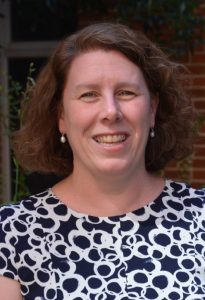OXFORD, Miss. – Intimate partner violence is a prevalent, yet often overlooked, health issue for many people in the United States. According to the U.S. Centers for Disease Control and Prevention, it affects one in four women and one in 10 men during their lifetimes.
Violence by intimate partners can greatly affect the health of victims, sometimes in ways that go unseen, said Marie Barnard, an assistant professor of pharmacy administration in the University of Mississippi School of Pharmacy.
“Intimate partner violence is associated with negative health consequences – from acute injuries to worsening of chronic diseases,” Barnard said. “Victims are less likely to be adherent to their medications and have higher total annual health care costs.”
For many victims, their health care provider can be a source of support. Community pharmacists are no different, but it’s important for them to have tools and resources to help their patients.
However, pharmacists lack specific resources that would give them the expertise needed to support patients experiencing intimate partner violence, Barnard said.
“All other health care provider groups, except pharmacists, have recommendations and required education related to intimate partner violence,” she said.
But pharmacists have a crucial role to play in combating intimate partner violence, Barnard said. For many people, a community pharmacist is someone they see regularly. Equipping pharmacists with the right tools could make a huge difference, she said.
“Being aware of intimate partner violence, making educational materials available, learning how to handle a disclosure, and being prepared to make a warm referral to local resources for victims are important things pharmacists can do to be a part of the health care response,” Barnard said.
Fortunately, those resources could soon be on the way. Barnard is undertaking a pilot research project to develop training programs for pharmacists, as well as intimate partner violence prevention programs to be used in community pharmacy settings.
As part of the project, Barnard will spend time interviewing pharmacists about their experiences with patients who have experienced intimate partner violence and what resources they would like to have available. She also plans to interview victims to get their perspectives on how pharmacists could better support them.
Barnard also will develop video resources that can be used to educate both pharmacists and student pharmacists on how to care for patients exposed to intimate partner violence.
The researcher will be supported in her efforts by two organizations, the Academy on Violence and Abuse and the university’s Sarah Isom Center for Women and Gender Studies.
Barnard was selected to participate in AVA’s 2020-21 Scholars Program. The program is a yearlong mentorship, during which she will learn from providers in other health care sectors who have experience in treating patients experiencing intimate partner violence.
She also was named a 2020-22 fellow by the Isom Center. The fellowship will provide Barnard with funding needed to complete her research.
Alicia Bouldin, an Ole Miss professor of pharmacy administration, has worked with Barnard and recommended her to be named an AVA scholar. She pointed to Barnard’s work preparing student pharmacists to help their patients.
“Dr. Barnard has shepherded numerous discussions with student pharmacists, bringing about an empathy through awareness where the students had previously been unknowing, and providing them with communication tools and professional responses,” Bouldin said. “This has been a gift to those student pharmacists, which through them may positively affect their patients and pharmacist-patient relationships.”
Bouldin also cited Barnard’s dedication, both in her research and for helping patients.
“Another reason I deemed her to be exceptionally qualified is her commitment to the population affected by intimate partner violence, which is often underserved,” Bouldin said. “The energy with which she engages social research and education is palpable, and often motivates those around her by example.”
Together, the Scholars Program and Isom Center fellowship will provide the assistance needed to conduct her research, Barnard said.
“These projects are synergistic,” she said. “The Isom Fellowship provides some financial support for these pilot studies and the AVA Scholars Program will provide me with mentorship to complete these pilot studies.”
“I am grateful for the support from these organizations and hope that our work in these areas can have a positive impact on patients.”
